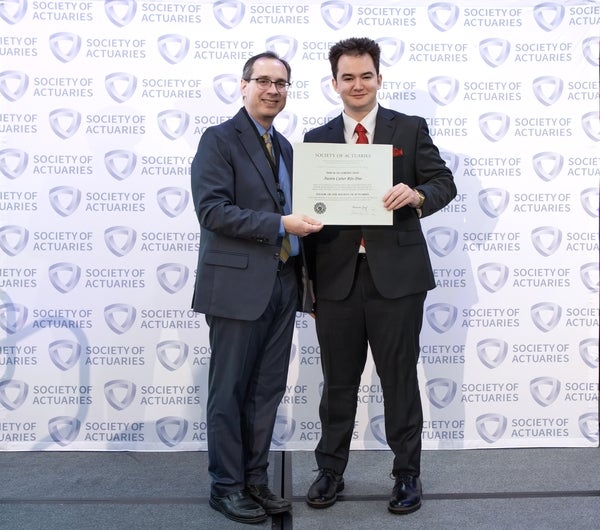Austin Riis-Due was a high school senior in Fort Worth, Texas, when he passed his first actuarial exam. His friend Matt, a freshman at Texas A&M, had heard about becoming an actuary from his campus Math club, and thought that Riis-Due might be interested.
The friends decided study for that first exam – Probability, or Exam P – on a whim, and after passing the notoriously difficult exam on the first try, Riis-Due was well on his way to becoming an actuary before he even began studying mathematics at The University of Texas at Austin. He graduated three years later with seven Society of Actuaries (SOA) exams under his belt.
Now, Riis-Due is ahead of the game again: as a 24-year-old PhD candidate in Actuarial Science & Quantitative Finance at Waterloo, Riis-Due has passed all ten actuarial exams and been named a Fellow of the Society of Actuaries (FSA). This distinction is usually not achieved until actuaries are in their mid to late career.

SOA past president and chair Timothy Rozar presents Austin Riis-Due with his FSA diploma
“I was only able to achieve this because Waterloo has a superior program in actuarial science,” Riis-Due says. “When I first started graduate study here, I enrolled in two classes from Professor Yi Shen that really prepared me for the three Fellowship level exams. Those exams are notoriously difficult – one has a 29.4% pass rate – and I don’t know if I would have passed them without that training and mentorship here at Waterloo through Professor Shen, and my advisors Professor David Landriault and Professor Bin Li.”
“As Austin’s PhD supervisors, we feel very fortunate to work with such a high-achieving and dedicated PhD student,” say Landriault (professor of Actuarial Science) and Li (associate professor of Actuarial Science). “In only his third year as a doctoral student, Austin already ranks among the very top PhD candidates the Department has welcomed in recent decades. This most recent fellowship achievement serves as yet another reminder of his remarkable and unique talent. We want to congratulate Austin for achieving this exceptional milestone at such an early stage of his academic journey.
The Math of Randomness
Riis-Due’s love for math is what initially drew him to actuarial science. “As a high school senior I was taking this great class with a unit on quantum physics from UT Austin, so I’d seen a little bit of probability, and the first actuarial exam was on probability. I hadn’t seen it applied to modeling finance – and the math of randomness – before then. It gave me an opportunity to model the whole world with a new perspective.”
At first, Riis-Due’s father was dubious about his son’s choice of career. “He thought I’d be a math nerd in a back room who would never see the light of day again!” he laughs. Still, once Riis-Due’s father realized how rigorous actuarial science was, and how passionate his son was about it, he became one of his biggest supporters.
“It’s been so important for both of my parents to have my back,” he says. “My mother is the strongest person I know. Nine weeks ago, she broke both of her shoulders, and despite that she flew out to Florida to the Fellowship Admissions Course (FAC) to see me get that achievement.” The FAC is the last step toward fellowship, and where candidates receive their FSA diploma.
At UT Austin, he found engaged and supportive professors who helped him advance quickly through the field. Realizing that he was entering undergraduate courses having already passed the exams they were meant to prepare him for, they encouraged him to enroll in research modules that would allow him to undertake independent study. He is particularly grateful to Mark Maxwell, Milica Čudina, Gordan Žitković, and Jennifer Austin for their mentorship as he completed his undergraduate courses a year early and prepared to enter graduate school for his PhD. Maxwell personally recommended Waterloo for its renowned graduate program in actuarial science.
Riis-Due’s time in university also nurtured his other great love: the Texas Longhorns, UT Austin’s famous college football team. “The Longhorns are very special to Dad and me,” he says. “He even named me after the location of his alma mater!”
A Global Community
While math and physics were what drew Riis-Due to actuarial science, it was the close-knit community that kept him there. “Everyone I have met has been incredibly nice, and everyone knows each other,” he explains. “The actuaries of the world probably couldn’t fill a college football stadium, but the risk that they manage and the world that they consult on is vast. To be able to model trillions of dollars of risk; the enormity of scale that this small group of people models is immense. And at the end of the day you get the feeling you’re genuinely helping individuals and corporations manage these large scale risks so they can focus on living and succeeding, which to me makes a difference in the lives of people and industry.”
Far from spending all of his time in a dark room, Riis-Due has already traveled far and wide because of actuarial science. In the last year alone, he’s visited Greece and Belgium to collaborate on research. He’s currently working on two papers, one with a professor from Hong Kong, and the other with his advisors. This June he’ll head to Paris, then Nairobi to present his current research projects at two conferences.
He’s found community here at Waterloo, too: in the “superb and unrivaled” mentorship of his professors, and inthe friendship of fellow PhD researchers from around the world. Their favorite thing to do together? Watch Longhorn football at Austin’s place on Saturday nights.
“I’m so grateful that I can become an academic while working so close with industry to solve real-world problems,” Riis-Due says. “If you’re considering graduate studies in actuarial science, you can’t do better than Waterloo.”